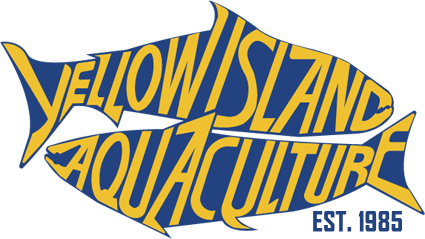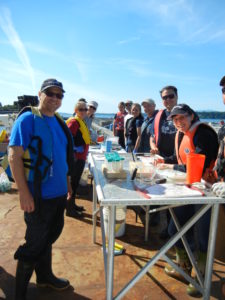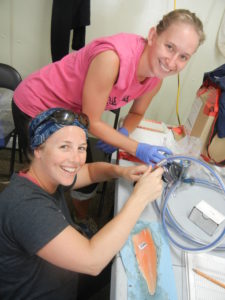


With scientist physicians as the principals of the company Yellow Island started out with a commitment to evidence-based practices in the operation of our enterprise. The company identified areas of deficiency in the knowledge base concerning the basic biology of the Pacific salmon and also in the environmental and ecological effects of aquaculture. We were also concerned about the deficiencies in perception and communication between aquaculturalists and the other members of society as a whole. Our extensive contact with the research community in our previous careers enabled us to seek out and work with the people with the specific areas of expertise to help us in our quest to redress these deficiencies.

Yellow Island’s research efforts can be broadly divided into several categories.
The first and arguably most crucial one is the basic biology of Pacific salmon. We intended these efforts to be generally applicable and on occasion have worked with other species of fish and even other organisms in order to increase the scope of the program.
The second area in which the company has been active is understanding environmental and ecological interactions mitigation.
We are also interested in social perceptions of aquaculture and have been active in developing organic standards and applying them and also in assessing the public’s perception of organic production and standards.
In addition the company has been active in applied research efforts in development of new net technologies and evaluating novel rearing strategies and facilities both in the freshwater and in the saltwater phase.
This research program in addition to producing a superior aquaculture product has also produced a large number of peer-reviewed publications and has also resulted in the training and graduation of a number of highly qualified personnel. We have lost count of the number of the poster presentations and conference presentations that have evolved from Yellow Island research efforts.
See PUBLICATION LIST See HQP LIST
Recently Yellow Island was honored with the prestigious NSERC SYNERGY Award for Innovation and collaboration in biological science for small and medium companies.
We have recently received funding from the MITAC group for a postdoctoral student and the company was recently notified that a collaborative research and development project has been funded through NSERC with the University of Windsor. Other applications are in progress to further our investigations into these important issues.
Below is a list of the current active research projects underway at Yellow Island Aquaculture.
| PROJECT | # | PROJECT DIVISION |
|---|---|---|
| TRIPLOIDS | 5 | Triploids – Gene Expression |
| MUSSELS | 8 | Mussel Genetics |
| BROODSTOCK–SRM | 9 | Broodstock – Sex Reversed Males |
| SPAWNING CHANNELS-SRM | 11 | Broodstock – Mate Choice Sex Reversed Males |
| NATURAL vs HATCHERY SP. | 35 | Spawning Behaviour and Performance Natural Spawning vs Hatchery Origin |
| MOLECULAR GENETICS | 39 | Molecular Genetics of Pigments in Chinook Salmon |
| GENETICS AND PHYSIOLOGY | 42 | Genetics and Physiology of Growth, Survival and Reproduction in Salmon |
| GENETIC LOAD | 44 | Genetics of Growth, Survival and Reproduction in Self Crossed Salmon |
| SMOLT BRAIN TRANSCRIPTION | 47 | DNA Transcription in the Brains of Chinook Salmon Smolts |
| DETERMINANTS of JACKING | 49 | Behavioural Determinants of Alternative Reproductive Strategies |
| HIGH PERFORMANCE CULTURED CHINOOK SALMON | 50 | Development of High Performance Chinook Salmon Stocks for Commercial Aquaculture |
| CORTISOL – STRESS | 51 | Variations in Cortisol Levels as Indicators of Stress in Chinook Salmon |
| BEHAVIOURAL VARIANTS | 52 | Genetic & Environmental Determinants of Variations in Behaviour of Chinook Salmon |
| MATURATION AGE & BRAIN REGULATION | 53 | Neural Regulation of Alternate Reproductive Strategies in Naturally Spawning Salmon |
| VARIATION in IMMUNE CAPACITY | 54 | Immune Characteristics of High Performance Chinook Salmon for Commercial Application |
| OPTIMIZING FEED CONVERSION | 55 | Feeding Determinants of Optimal Growth of Cultured Chinook Salmon |
| PHENOPYTIC PLASTICITY | 56 | Phenotypic Plasticity of Gene Transcription – Methylation |
| ANAESTHESIA | 57 | Humane Anaesthesia of Salmonids |
| NET TECHNOLOGY | 58 | New Net Technology for Containment Structures |
| IMMUNE FUNCTION SMOLTS | 59 | Immune Function of S0 & S1 Smolts |